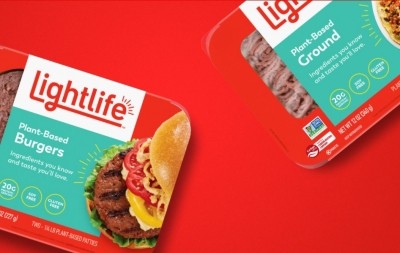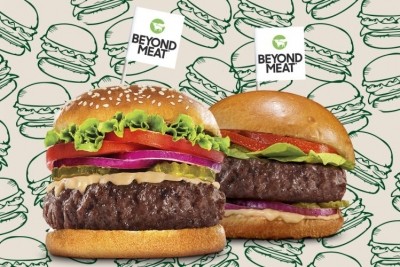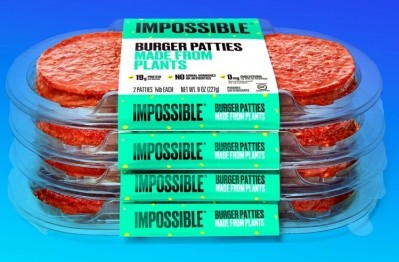Plant-based meat webinar highlights… from Impossible Foods’ global ambitions to those ‘frankly desperate’ Lightlife ads

(Click here to register and watch it on demand; if you’ve already registered, click here.)
While plant-based meat currently only accounts for about 1% of the market (whereas plant-based milks have captured 14% of the fluid milk market), the total addressable market is potentially vast, claimed Impossible Foods’ CFO David Lee.
“When I started in late 2015 as COO, what kept me up at night was whether our bet on meat eaters would pay off… I don’t worry about that anymore; we’re seeing this huge TAM [total addressable market]. Three-quarters of every dollar we get in revenue comes from people who are trading off other choices from meat, and of that something like 92% of that source of sales comes from meat from animals.
“We’re also seeing high repeat rates. We launched our direct to consumer site in June and we’re seeing something like 73% of our DTC customers report having it [the Impossible Burger] previously in a Burger King and a very large percentage say they want to repeat.
“Meat eaters are voting with their stomachs and the meat eater will determine the future.”
Chicken, whole cuts of beef and pork, and seafood all to come from Impossible Foods
Lee, who has previously stated a goal to “produce a full range of meats and dairy products for every cultural region in the world,” added that beef and pork are just the beginning: “I remember back in 2016/2017 walking into an R&D day at Impossible Foods and seeing prototypes of whole cuts of [plant-based] meat, and egg that are entirely made from plants.
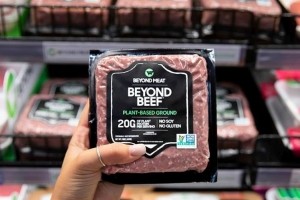
“The technology you see in the Impossible Burger is actually quite relevant for other categories, whether that’s chicken or whole cuts of beef or pork, or seafood.”
Europe, China and Brazil…
As for Impossible Foods' international ambitions, he said: “We will enter every market and we’ve been hard at work for some time, not just on what you see in the US and in Singapore, Hong Kong, Canada and Macau, but we’ve been hard at work on preparing the path to enter larger markets such as Europe, China and Brazil.
"And while we’re not giving a specific date, we believe those markets are open to us, and we’re excited to get to them soon.”
Pricing: ‘The issue today is mostly scale’
When it comes to pricing, said Lee, “We’ve been on the record that we believe that our technology at scale will be price competitive not just with premium ground beef, but with commodity 80:20 beef, we just need to grow and scale.”
Chuck Muth, chief growth officer at Beyond Meat, who said that “at least one of our products will be priced at or below animal meat, likely beef” within four years, added: “The issue today is mostly scale, we’re still building out supply chain capabilities … and also the cost of raw materials is not scaled yet, so we do anticipate that over time, we will be less expensive than animal meat.”
As for Beyond Meat’s ingredient toolbox, which is currently dominated by peas, but includes some mung bean and rice protein, he said, “We will continue to explore other proteins options. You get to Asia for instance and soy becomes an important source of protein… but there is almost an unlimited number of plant proteins that could be used. The barrier today is scalability.”
US retail sales of fresh plant-based meat were up 126% year on year in the 30 weeks to Sept 26, while fully cooked plant-based meat sales (mostly frozen products) were up 38.5% year on year, according to new data from Nielsen shared with FoodNavigator-USA.
However, regular fresh conventional meat sales were also up 28% year-on-year over the same period, which is significant given the relative size and maturity of this market by comparison.
Picture credit: Hannaford
Planterra Foods: Bringing new users to the category
Darcey Macken, CEO at Planterra Foods (part of meat giant JBS), which has just launched the OZO plant-based meat brand featuring pea and rice protein fermented with mycelium from MycoTechnology, said: “Pricing is a barrier [for some consumers] today, so we’re focused on finding cost-effective solutions but it has to be with quality ingredients, so we’re also big fans of fermentation which brings the taste to life but also delivers nutritional benefits that consumers care about.
“People are curious and there’s a lot of trial going on as people are looking for innovation and variety, so we’re making sure we’re communicating how we’re different and we know that over a quarter of our total users are new to the category.”

Planterra's soy-free OZO product line has more protein, less saturated fat and fewer calories than 80:20 ground beef burgers and most rival plant-based offerings, claimed Macken.
To place this in context, each OZO burger contains more protein (22g vs 20g for the Beyond Burger, 19g for the Impossible Burger), a lot less saturated fat (2g vs 5g for the Beyond Burger, 8g for the Impossible Burger) and fewer calories (210 vs 260 for the Beyond Burger and 240 for the Impossible Burger), she said.
“Initially we wanted to take advantage of the traffic going to the fresh meat case but it’s really exciting to see frozen grow as well, and we are taking a look at this as we see an opportunity to grow in fresh and frozen.”
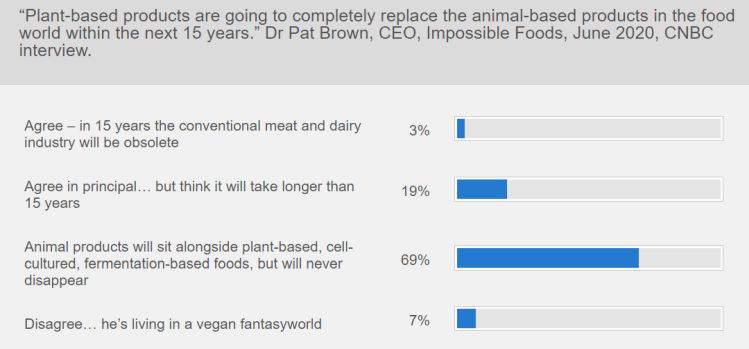
Meati Foods: ‘We’re creating a whole new category’
Dr Tyler Huggins, co-founder at fungi-based meat co, Meati Foods, said his company can “easily make ground products," but sees an opportunity to distinguish itself by producing ‘whole cuts’ such as steaks and chicken breasts, a clear white space in a category dominated by processed products such as burgers, sausages and meatballs.
“We’re an alternative to animal products and we’re targeting the same usage occasions [as regular meat], but we’re not trying to be an analog, we’re creating a whole new category.”
The exciting thing about the naturally occurring organism Meati is using – a strain of mycelia, the filamentous-like root structures of mushrooms – is that it’s inherently high in protein and fiber, and can be grown highly-efficiently in fermentation tanks fed with “a cheap carbon source like sugar,” said Dr Huggins.
“It’s extremely efficient to produce, with a very similar amino acid profile to beef, plus it has the fiber and vitamins and minerals you only find in plants, so probably it’s one of the most nutritious single ingredients out there.”
Lightlife ad: ‘It speaks of desperation frankly…’
When it comes to what will distinguish the winners from the losers in the plant-based meat category as it becomes more competitive, Chuck Muth at Beyond Meat said consumers would vote with their wallets.
Asked about recent attempts by Lightlife Foods to pit itself against Beyond Meat and Impossible Foods by positioning itself as “a real food company,” with products “developed in a kitchen, not a lab," he said:
“Lightlife’s ingredient panel looks very similar to Beyond Meat’s yet somehow they make theirs in the kitchen and we were made in a lab, I don’t know how that works … "
He added: "Of course we want to win, but it’s critically important for all of us that this category grows. If the category stagnates, we’re all done.
“It’s a competitive category, but the two leading players are Impossible Foods and Beyond Meat, so for one of the brands in the category to attack those brands is completely self-defeating and non-strategic, and it speaks of desperation frankly, and we’re not happy about what they did.”
‘Unethical and controversial tactics’
David Lee at Impossible Foods, which uses a genetically engineered strain of yeast to produce its star ingredient, soy leghemoglobin, added: “If you think about it, that campaign was financed by one of the largest animal agriculture companies in North America [Lightlife Foods is owned by Canadian meat giant Maple Leaf Foods], and it was incredibly misleading.
"As 90% of our consumers are meat eaters, maybe those in the meat industry think they have to resort to some of these frankly unethical and controversial tactics.” (Read about Lightlife's response to these criticisms HERE.)

When it comes to its ingredients and production process, he said, “Our approach has been to be radically transparent and so far that approach has proven to be pretty successful.
"Meat eaters can read a package, they can go online, they can figure out what’s a misleading attack or a real critique, and as long as we do that, the market will find its way to the best product.”
Shear cell technology, and spinning… ‘Extrusion is definitely not the only game in town’
So what about the technology underpinning plant-based meat?
When it comes to texturizing proteins, said Dr David Welch, director of science and technology at The Good Food Institute, “Extrusion is definitely not the only game in town.
"There are a couple of technologies that are interesting including 3D printing where we’re seeing some advances, and shear cell technology [read more about this from Givaudan, which is working on the Plant Meat Matters project in Europe], which is interesting from a sustainability perspective as it uses less energy, but also because it’s a batch process [unlike extrusion, which is a continuous process] so it will allow for use in different types of applications.”
He added: “I think another interesting technology is spinning, which was used by General Mills in the 1960s and 1970s to create textured proteins, but we’ve seen some advances of spinning of fibers in other industries which can now be applied to plant proteins.”
‘We’ve really just scratched the tip of the iceberg in terms of what’s possible’

On the formulation front, he said, “the use of novel ingredients such as mycelium is another way to introduce better textures into the plant-based meat category. There are now over 40 companies working on fermentation-derived ingredients and much like the blending of proteins from the plant kingdom we’ll see the same thing with combining proteins from plants and microbial fermentation.
“I think we’ve really just scratched the tip of the iceberg in terms of what’s possible and I think we’ll see a lot more novel ingredients being introduced to improve flavor, appearance and aroma.”
If there’s one particular area to watch, he said, it’s fat: “I think we’ll see the introduction of more functional plant-based fats that more closely mimic animal fats hopefully with a better environmental footprint, and the use of fats and oils derived from fermentation processes or even cell-based or cultivated fats.”
Market projections are all over the place when it comes to the addressable market for plant-based meat, with Wells Fargo predicting it will account for around 4% of the US market in 10 years while Bernstein reckons it could be as much as 12% or even 15%.
On a global basis, AT Kearney predicts plant-based meat could account for a staggering 23% of the market by 2035.
Read more from the Good Food Institute HERE.
Picture credit: Kroger
FREE webinar Oct 28: Kids and the plant-based trend
Plant-based meat, dairy and egg products are gaining traction, from the next generation of burgers and nuggets to oat milk lattes.
But are these just for adults? Where is the opportunity in plant-based for kids, from a new generation of ‘hybrid’ products combining meat and plants, to new plant-based milks with added protein and DHA?
Find out on October 28 at our FREE webinar, 'Kids and the plant-based trend,' the second installment of our virtual FOOD FOR KIDS series.
- Kyle Gaan, research analyst, The Good Food Institute
- Adam Lowry, co-founder and co-CEO, Ripple Foods
- Kristie Middleton, VP business development, Rebellyous Foods
- Hema Reddy founder and CEO, Crafty Counter (Wundernuggets)
- Marlena Hidlay, early life nutrition segment lead, DSM North America
- Mark Fahlin, business development manager, Cargill






